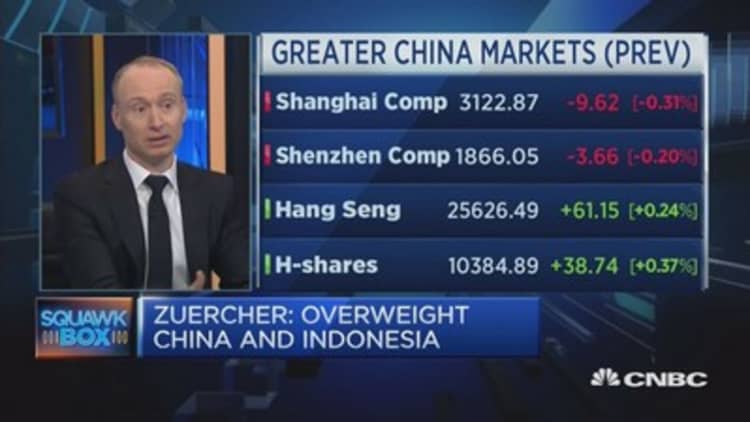MSCI should add mainland Chinese stocks to its benchmark emerging markets index soon, some analysts say, especially as major U.S. asset managers push into China despite obstacles.
The stock index giant plans to announce around 4:30 p.m. ET Tuesday whether mainland stocks will become part of the MSCI Emerging Markets Index, which is tracked by an estimated $1.5 trillion in assets. The review is the fourth straight year MSCI has considered adding the mainland-traded stocks, known as A shares in China.
Their addition could be a big boost to the world's second-largest stock market, which has until now drawn limited foreign investor interest because of high volatility, frequent trading halts and limited foreign investor access to the Shanghai and Shenzhen stock markets.
But U.S. asset managers have been eager to push into the local market. China has the largest weighting in the MSCI Emerging Market Index, at 27.66 percent, although that only includes Hong Kong and U.S.-listed shares of Chinese companies.
"Increasingly, individual firms are opting in to, not out of, the China market. Any decision to move on the part of MSCI would now be reactive," Chantal Grinderslev, senior advisor at Shanghai-based investment management consulting firm Z-Ben, told CNBC.
MSCI did not immediately return a CNBC request for comment.

Last year, MSCI rejected the A shares because of limitations on how much foreign investors can withdraw and a requirement for pre-approval from Chinese authorities for direct foreign investment in A shares. Those restrictions still exist, but major U.S. asset managers have since expanded in China despite them.
"Ultimately, MSCI reflects the views of their clients," said Brendan Ahern, chief investment officer for KraneShares, which runs several U.S.-traded China exchange-traded funds. "I think their end clients want this to happen because they want to do business in China."
In January, Fidelity International became the first global asset manager allowed to introduce investment products in China through a wholly owned local subsidiary.
"The long-awaited inclusion of A-shares in MSCI China would help institutionalise the domestic China A-share market," Hong Kong-based Fidelity International Portfolio Manager Jing Ning said in a Monday note.
Vanguard in May officially opened an office in Shanghai. But four years ago its Emerging Markets Stock Index Fund stopped tracking the MSCI index, and it eventually transitioned to an MSCI indexing rival, the FTSE Emerging Markets All Cap China, which includes A shares. "It is our view that A-shares belong in emerging market benchmarks," Vanguard spokesperson Freddy Martino said in an email.
BlackRock, which runs the $31.6 billion benchmark iShares Emerging Markets ETF (EEM), said in a widely reported statement that it is "supportive of China A-share inclusion in global indices." BlackRock said it might give a statement after the decision is announced on Tuesday.
Most analysts hope MSCI will make the move this year
Analysts say new requirements MSCI announced since last year's review help the case for inclusion of mainland Chinese stocks.
MSCI cut the number of potential A share additions to the index to 169 large-cap stocks from 448. The index giant eliminated stocks not accessible to foreign investors through the Hong Kong stock connect program with the Shanghai and Shenzhen exchanges. MSCI also removed stocks that had been suspended for more than 50 days.
"Realistically, can you go a fifth time? Maybe, but I'd be very, very surprised," said Barnaby Nelson, managing director and head of securities services — greater China and north Asia, for Standard Chartered in Hong Kong. "I don't think another year would be helpful. ... There's not that much left to achieve" in meeting MSCI's requirements.
"The odds seem to be higher this year," Larry Hu, head of greater China economics, said in a late Sunday note. "Then A-shares, the world's second-largest stock market, would account for 0.5% of the MSCI Emerging Market Index."
Standard Chartered's Nelson estimates $8 billion in assets under management will flow into the MSCI Emerging Markets Index as a result of initial A share inclusion.
Potential weighting of Chinese A shares in the MSCI Emerging Markets Index
Source: MSCI
To be sure, positive asset manager sentiment and China's efforts to open up the mainland markets may still not be enough for MSCI this year.
"We think the answer will likely be a 'no'," said Lucy Qiu, emerging markets strategist at UBS Wealth Management. She cited the pre-approval rules as "quite a hassle for many investors."
The local stock market also has low expectations.
The Shanghai composite is up 1.3 percent year to date, in contrast to gains of more than 17 percent for the EEM and Hong Kong's Hang Seng stock index. The S&P 500 is up nearly 9 percent this year, around all-time highs.
"Inclusion would be an important landmark for China's equity market and may spur a short-term rally amid expectations of fresh liquidity entering the onshore market," Ian Hui, a global market strategist at JPMorgan Asset Management, said in a May 19 note that put a greater chance on adding Chinese A shares. "MSCI inclusion will likely improve market sentiment at a time when China's authorities are increasing their regulatory scrutiny."
Increased supervision of insurance companies and other tightening measures by Chinese authorities have contributed to the Shanghai stocks' muted performance this year. Heading into MSCI's 2015 decision on A shares, high expectations of inclusion helped drive the Shanghai composite to more than seven-year highs, before the index crashed more than 40 percent that summer.
Short interest in the oldest U.S.-traded China A Share ETF, ASHR, climbed to 11 percent of shares outstanding on June 1, the highest since mid-January, according to IHS Markit.
— CNBC's Everett Rosenfeld contributed to this report.


